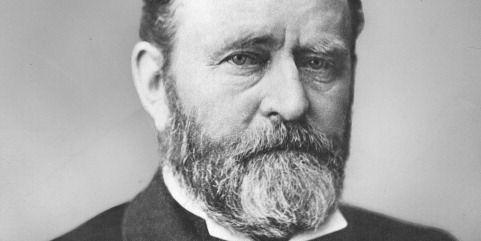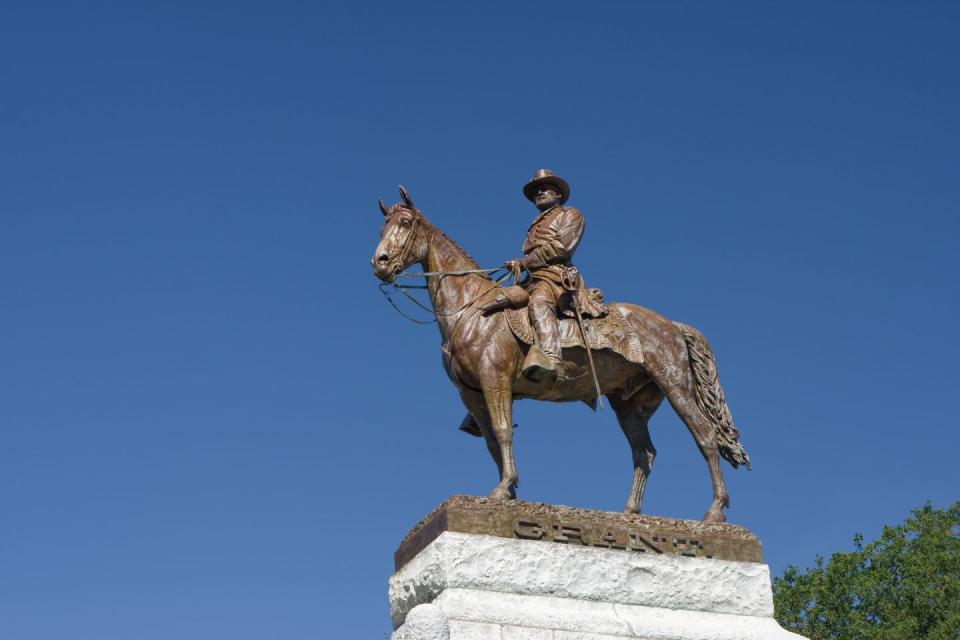President Ulysses S. Grant’s Need for Speed Led to His 1872 Arrest
- Oops!Something went wrong.Please try again later.

"Hearst Magazines and Yahoo may earn commission or revenue on some items through these links."
With former President Donald Trump’s recent social media post that he is anticipating his arrest on Tuesday, you might be wondering if any other commander-in-chief has ever run afoul of the law and been arrested for it.
Yes, it turns out. William Henry West of the Washington, D.C. Metropolitan Police Department apprehended sitting President Ulysses S. Grant in 1872 for speeding in his horse and buggy. No, we’re not kidding.
Grant’s reckless “driving” is the only recorded instance of a sitting or former U.S. president being placed under arrest.
Ulysses S. Grant’s Need for Speed
John Marszalek, the executive director of the Ulysses S. Grant Presidential Library, said in a 2018 interview with NPR that Grant—born April 27, 1822, in Point Pleasant, Ohio—loved to race horses during the early part of his life.
According to the Ulysses S. Grant National Historic Site in St. Louis, Grant had a natural ability with horses and trained them for his neighbors in Georgetown, Ohio, as a young boy. After graduating from West Point in 1843 and while serving in the U.S. Army prior to the Civil War, he followed horse racing wherever he was stationed.
Grant enjoyed serving in Detroit because buggy racing was popular around the city. While stationed there, he bought a horse from a local politician for $200 and turned it into a feared racer.
When Grant bought his White Haven home in St. Louis from his in-laws in the 1850s, he turned the property into a horse farm. While in Washington, D.C., Grant, who was inaugurated March 4, 1869, frequently sent notes to White Haven caretaker William Elrod about how to properly care for the horses there.
What Happened During Grant’s Arrest?

The story of Grant’s arrest appeared in the September 27, 1908, edition of the Washington Evening Star. Former Metropolitan Police Chief Cathy Lanier confirmed the tale in a 2012 interview.
Two days prior to the president’s arrest, a buggy driver struck a woman and her 6-year-old son at the corner of 13th and M streets. The police dispatched Metro Police’s Officer West to investigate complaints of speeding carriages.
According to the Evening Star article, West was speaking to witnesses the day after the incident when another group of carriages, including one piloted by Grant, sped toward the scene. West held up his hands for the group to stop and told the president he was going too fast. “Your fast driving, sir, has set the example for a lot of other gentlemen,” West said, according to the article.
Grant apologized and vowed to never do it again but broke his promise only a day later when he careened toward the same intersection. West stopped him again and said he had no choice but to take the president to the station.
According to the Ulysses S. Grant Cottage historical site in Wilton, New York, Grant paid a $20 bond and didn’t show up to a trial the following day, forfeiting his money. Instead of using his lofty stature to avoid the fine or threaten West, Grant reportedly commended the officer for doing his job fearlessly.
Lanier said Grant received three citations for speeding during his presidency. Grant and West were said to have met frequently afterward, bonding over their shared love of horses.
Who was William H. West?
West, who was Black, was born in 1842 in Prince George’s County, Virginia, and began his life as a slave, according to the National Law Enforcement Officers Memorial Fund.
During the Civil War, he served in Company K, 30th United States Colored Infantry and notably fought in the Battle of the Crater in Petersburg, Virginia, on July 30, 1864.
According to BlackPast.org, West married Kathrine Bowie in 1867, and the couple had six children.
The Metropolitan Police Department appointed West in 1871, and he was one of only two Black policemen to work for the organization during Reconstruction. He retired from the MPD in September 1901, only months after an arrest for disorderly conduct. West died on September 15, 1915, in Washington, D.C.
Could Trump Be Next?
Trump, who predicted his arrest on his Truth Social account Saturday, is the subject of an investigation into a hush money scheme involving adult film actress Stormy Daniels, whose real name is Stephanie Clifford. Daniels and her attorney met with prosecutors from the Manhattan District Attorney’s Office on March 15, according to USA Today.
The Wall Street Journal first reported in 2018 that Trump’s lawyer Michael Cohen arranged a $130,000 payment to Daniels a month before the 2016 election in an effort to silence her regarding an alleged affair with the former president. Cohen pleaded guilty to eight counts, including campaign finance violations and tax evasion, in August 2018 and was sentenced to three years in prison later that December.
CNN reported that city, state, and federal law enforcement agencies in New York City conducted meetings throughout the past week about security preparations for a possible indictment of the former president. Trump’s legal team has been preparing, too, although the former president hasn’t received any notification from the Manhattan District Attorney’s Office. Trump’s lawyer Joe Tacopina told the Daily News on Friday that the former president would cooperate if Manhattan District Attorney Alvin Bragg does criminally indict him.

